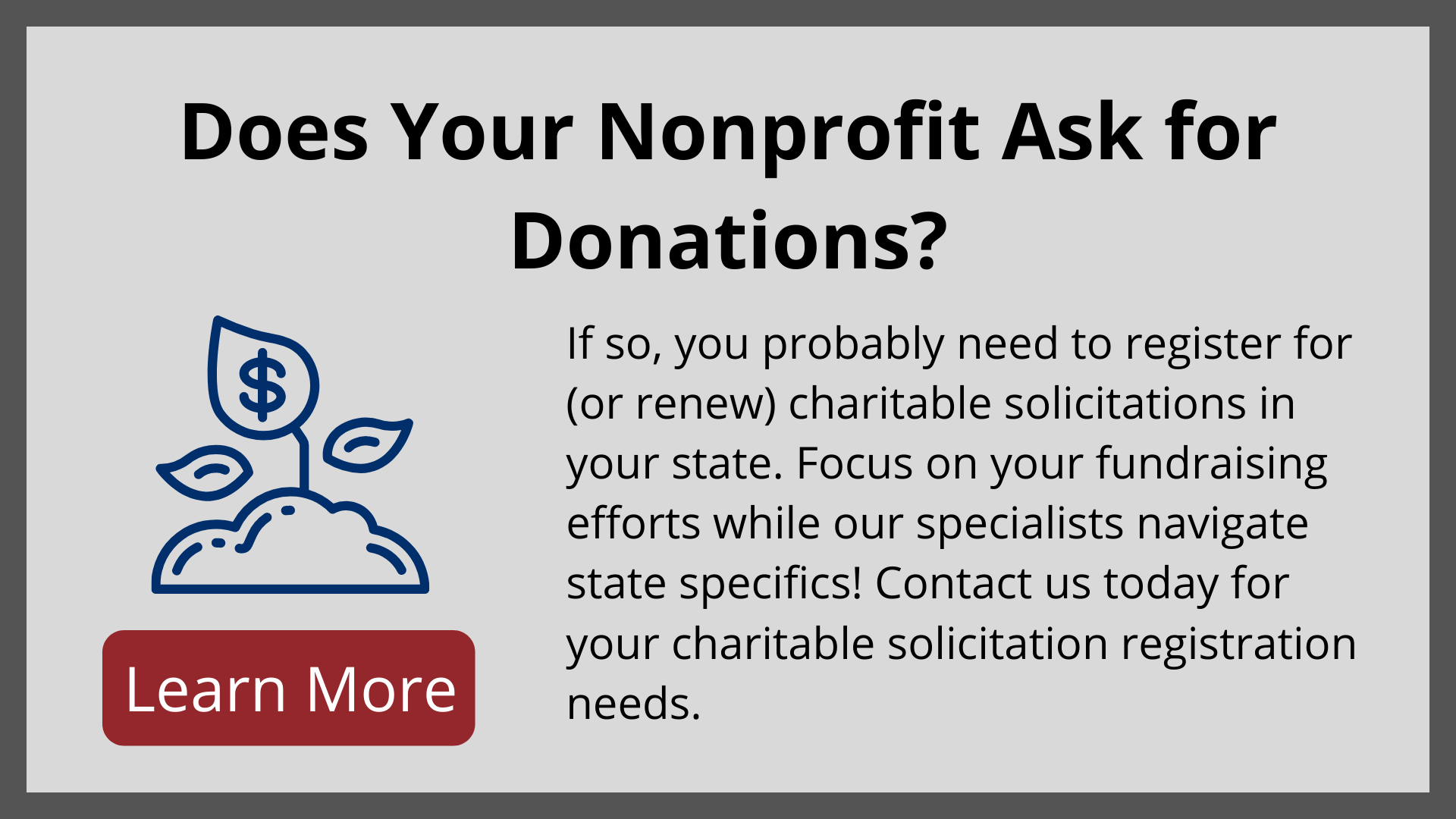Top 5 Risks of Fundraising Registration Non-Compliance

40 states, plus Washington DC, require 501(c)(3) nonprofits to register prior to soliciting donations. And, since most states now consider all forms of revenue generation by your nonprofit to be a solicitation, you simply must be aware of what is required.
Failure to register or to keep your existing registration current puts your nonprofit in peril. Let’s look at the top 5 risks associated with non-compliance with this required filing.
This is the one that you, as a reader, were most likely to guess. Raising funds for your nonprofit without having proper registration usually results in fines and penalties being assessed by the state.
I wrote about this in a post a few years ago. In a few states, fines are relatively low. In many others, they can be punitively expensive. For example, Maryland can fine you up to $5,000 per violation. So can our home state of Tennessee.
To make matters worse, some locations will not, under any circumstances, abate any assessed fines, even if you demonstrate that failure to comply was a good-faith mistake on your part. California and South Carolina have laws that prohibit any state agency or employee from removing a penalty once assessed for an infraction, unless it can be proven that the penalty was assessed in error. So much for throwing yourself on the mercy of the state.
Really? They would shut down my nonprofit for simply not being registered?
Actually, yes, it can happen. We saw it with a client who came to us after the state of Minnesota fined them over $20,000 in penalties, plus issued a cease-and-desist letter, effectively shutting them down until they could get compliant.
Usually, enjoining operations is a tactic used by a state charity office or an Attorney General to put an immediate stop to what they consider illicit behavior by a rogue organization. But as in the case of our Minnesota client, it might just be the discovery of multiple violations all at once, leading to the decision to shut down a nonprofit until they can fix their problems.
Either way, it is tremendously disruptive. Our client had to scrap a huge fundraising event, in which they had already invested thousands of dollars, and which had the potential to net many thousands more. We got them straightened out eventually, and Minnesota lifted the injunction. But, the damage was done.
Non-compliant behavior begets more of the same, whether intentional or not.
It’s not a good thing if an organization fails to register in a state where it’s required. If it is due to ignorance of the law, that’s bad enough. The information you need to know to determine your filing liability is just not that hard to find. Failure to seek out what is required of you likely forecasts a lack of compliance to come regarding other issues, as well.
If an organization’s failure to register is simply because those in charge don’t want to, or don’t think it’s a big deal (and we’ve seen that!), well that’s something else altogether. It is unlikely that leadership will ever put a priority on compliance, transparency, or any other hallmark of good governance. Donors would be wise to steer clear of such organizations.
Establish a healthy habit of staying in timely compliance with what’s required. Otherwise, it can be a slippery slope into a pattern of non-compliant behavior on a large scale that can completely undermine your mission.
Ok, to some extent this issue is addressed in the section about fines and penalties. But, it’s safe to say most readers are not aware that failure to comply with fundraising registration law is not just a civil issue, but potentially criminal!
As we discussed in the previously mentioned article, both Ohio and Florida consider certain failure-to-comply violations as felonies. In Tennessee, filing false or misleading information is Class B misdemeanor. Do it again and it becomes a felony. Other states assign criminal charges to particular violations as well.
All the risks associated with fundraising non-compliance point straight to this one: embarrassment and loss of reputation. All it takes is one publicized event that reflects badly on your organization to set you back years in donor relations. Realistically, it could be what you’ve done, or what you haven’t done. Either way, it’s not good.
Many states name-and-shame violators by listing them on their websites. Trust me, you don’t want to be on that list.
And don’t forget that donors are pretty savvy. They always have been, but it hasn’t always been easy for them to do their homework before giving. Not so much anymore. Many donors know that charities are supposed to be registered. If a potential donor looks on your state’s website to check on your registration status and it isn’t there, or isn’t current, don’t expect the gift. It’s that simple.
I think I’ve made the case for “Why.” So, what about the “How?”
Foundation Group provides charitable solicitations (fundraising) registration and renewal services for thousands of organizations each year. We work with all 40 jurisdictions, and we know what your nonprofit is required to do, whether it’s only in your home state, or 10 states. There’s simply no reason to risk operating out of compliance. We’re here for you, and we can help you do it right.
who subscribe to our free, email newsletter. It’s information that will empower your nonprofit!

